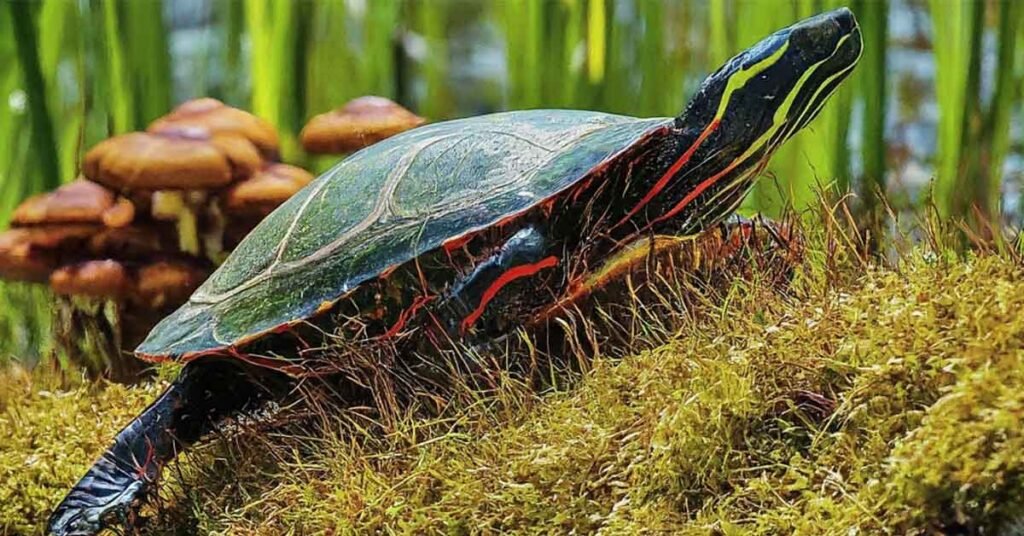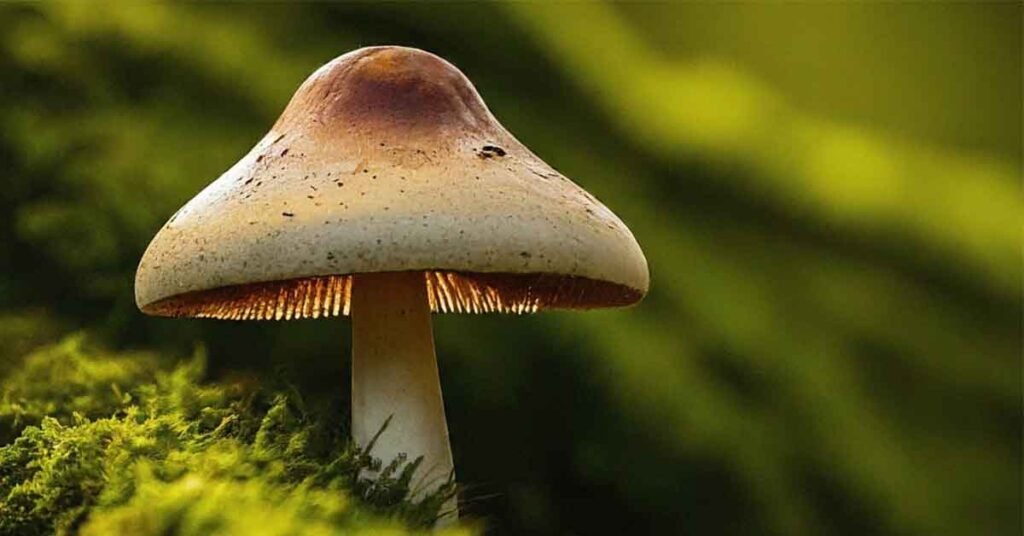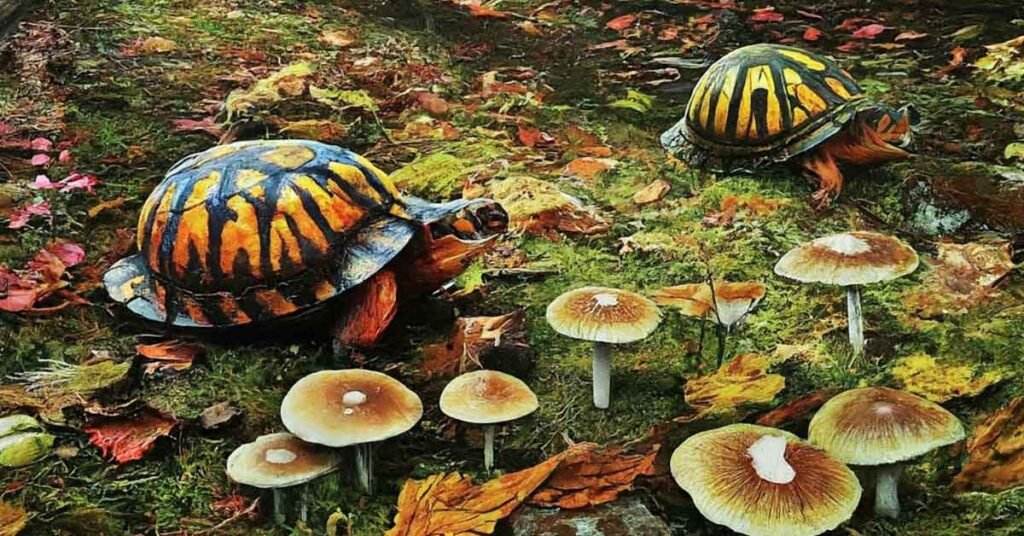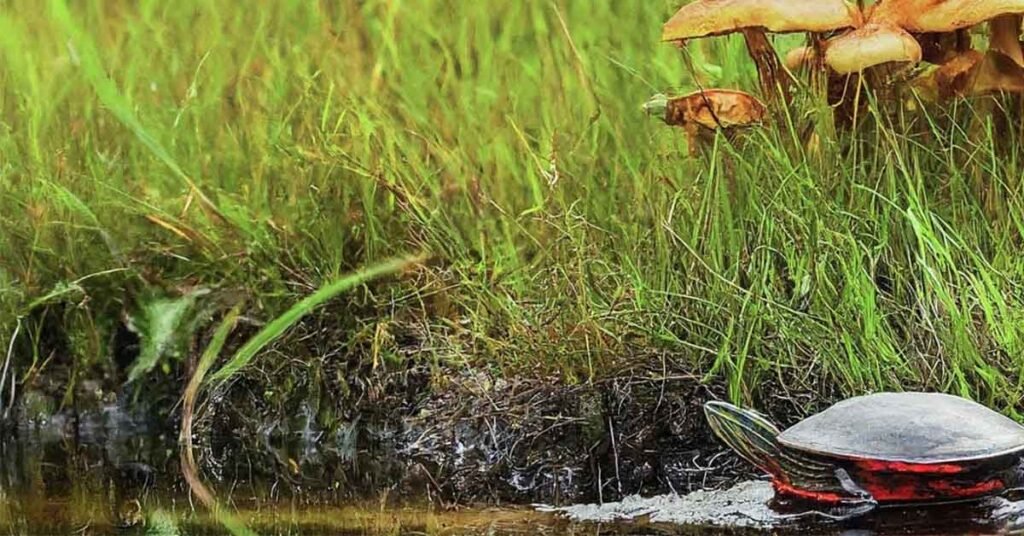Turtles follow a diverse diet, which is quite interesting if you are new to the turtle world. At the same time, turtles can be omnivores, herbivores, or carnivores. The majority of turtle species eat vegetables, fruits, and meat. As mushrooms fall into the vegetable category, new turtle owners may wonder – Can turtles eat mushrooms?
Some mushroom species can be added to turtles’ diets in moderation. Mushrooms are nutritious for humans, but not all mushrooms are safe for us. Today, we will delve deep into this question – can turtles eat mushrooms? How much should they get, or is there any risk of having mushrooms for turtles?
Table of Contents
Can Turtles Eat Mushrooms?

Yes, some turtle species can eat certain safe types of mushrooms. Many mushroom species are toxic to humans and even to turtles. Safe mushroom species are high in several nutritional values. They are rich in protein and vitamins and also low in calories. For example, shiitake mushrooms are safe for humans as well as for turtles.
In the wild, they can survive eating suitable types of mushrooms as they develop a survival instinct about their foods and other surroundings. However, before serving mushrooms to pet turtles, you have to be cautious about the type of food that is safe.
Types of Mushrooms that are Safe for Turtles

Mushrooms are the fleshy, fruiting part of fungi. They’re like apples on an apple tree, except mushrooms release spores instead of seeds. Many different types exist. Some are safe for human or turtle consumption, and others are not.
The following list of mushrooms is safe, as no poisonous ingredients are there so that turtles can eat them like us.
Shiitake Mushrooms (Cooked Only)
Shiitake mushrooms are one of the most eaten and safe ones for humans’ diet. Raw shiitake mushroom stems are tough, so you should discard them before serving them to the turtle. The stems should be only given when appropriately cooked.
While dried shitake mushrooms might be difficult for turtles to digest, cooked shitake mushrooms can be safe for them. These offer essential minerals like copper and selenium, but remember, cooking one is the safest option.
Button Mushrooms
Button mushrooms are safe for turtles. They are packed with vitamins B and D. These small white mushrooms will boost your turtle’s diet.
Cremini and Portobello Mushrooms
These two mushrooms are basically the same mushrooms at different maturity stages. They provide a satisfyingly meaty texture to your turtle and are a good source of fiber and antioxidants.
Oyster Mushrooms
Oyster mushrooms are packed with protein and vitamins, making them a great addition to your turtle’s diet.
Nutritional Breakdown of Mushrooms
Here is the nutritional profile for one cup (70g) of raw mushrooms, as provided by the USDA.
| Nutrient | Amount per Serving |
| Calories | 15 |
| Fat | 0.2g |
| Sodium | 3.5mg |
| Carbohydrates | 2.3g |
| Fiber | 0.7g |
| Sugars | 1.4g |
| Protein | 2.2g |
Besides the above values, mushrooms contain some micronutrients like copper, B vitamins, potassium, and iron. These are some essential nutrients for turtles’ health.
Health Benefits of Turtles from Mushroom Diet

Cultivated mushrooms are not a staple in your turtle’s diet, but they can be a delightful and nutritious treat. Here’s a breakdown of the goodies these fungi offer:
Protein
Mushrooms are a good source of protein. It is crucial for the growth and development of turtles.
Vitamins
Mushrooms contain vitamins, which are essential micronutrients for turtles. Even though they might be present in lower quantities than other foods. But, overall, these vitamins contribute significantly to turtles’ health if served in the right balance. The vitamins are
- B-Complex Vitamins (Riboflavin & Niacin): Support energy levels and metabolism.
- Vitamin D: Some mushrooms exposed to sunlight can contain vitamin D. It helps with calcium absorption for strong bones and shells.
- Note: Consult your vet for proper vitamin D supplementation, as mushrooms shouldn’t be the sole source.
Mineral
Mushrooms contribute essential minerals to your turtle’s health:
- Phosphorus: An essential mineral for bone health and other bodily functions. The phosphorus ratio needs to be less than calcium intake for turtles diet.
- Iron: Plays a role in oxygen transport and red blood cell production.
- Potassium: Keeps muscles and nerves functioning properly.
- Selenium is essential for cell function and overall health (though information on exact amounts in mushrooms for turtles is limited).
Also, mushrooms have copper and potassium as minerals, and they help to keep up with turtles’ energetic activity.
Fiber
Mushrooms provide fiber, however, in low quantities, which can aid digestion in turtles.
Low-Calorie Delight
Turtles are susceptible to weight gain from excess fat. Luckily, mushrooms are low in calories so that they can be given as guilt-free occasional treats.
Which Turtle Species Can Have Mushrooms?

Not all turtles are created equal for mushroom munching. In general, omnivorous turtles will enjoy mushrooms as part of a varied diet. Species like red-eared sliders, box turtles, and painted turtles are often adaptable eaters. They want a mix of leafy greens, insects, and even the occasional fruit or veggie, including safe mushrooms.
So, mushrooms can be a fun and exciting addition to these curious creatures’ meals. However, it’s important to remember that strictly herbivorous or carnivorous turtles might not like mushrooms. Sticking to their natural diet is best for them, whether they eat flowers and greens or insects and fish for protein.
Are there any Risks of Mushrooms for Turtles?
It’s essential to know some potential downsides to mushrooms before giving them to your turtle. Here’s why a little caution is key:
Toxins: Some wild mushrooms contain toxins that can be harmful or even deadly to turtles. They don’t have the enzymes to break down these toxins, so even a nibble can make them sick. Try commercially grown mushrooms from the grocery store, but remember, even these require some caution.
Digestive Dilemmas: Even some safe mushrooms might be harsh on your turtle’s tummy. Some varieties are harder to digest, especially if they need to be cooked properly.
Allergic Reactions: Just like us, some turtles can be sensitive to certain foods. If you’re introducing mushrooms, watch out for any signs of an allergic reaction.
How Often Should Turtles Eat Mushrooms?
Turtles can cause tummy troubles, just like many other foods, if you give them too often.
Here’s the golden rule: Mushrooms are considered high-protein for a “veggie” and shouldn’t be a staple in your turtle’s diet. Try adding them to their meals once or twice a week to make them fun and nutritious.
You should also pay attention to portion size. Smaller turtles can handle just a few button mushrooms (think 2-3) at a time. It helps their system adjust to the new food and avoid any digestive discomfort.
Start slow with these occasional mushroom treats, and you can gradually increase them to twice a week as long as the portions stay small.
How to Prepare Mushrooms for Turtles?
Get things ready before your turtle enjoys their mushroom treat! Here’s a quick guide:
Rinse & Repeat: Give those mushrooms a thorough wash under cool water to remove any dirt or hitchhikers.
Stem Removal: Turtle tummies might not appreciate the more rigid stems. Just chop them up and save them for your culinary creations.
Bite-Sized: Chop the mushroom caps into small pieces. Think bite-sized for your turtle—like the bits they’d find in the wild. This makes it easier for them to eat and digest.
Cook it up: Some turtles can handle raw mushrooms, but cooking them is safer. The cell walls break down, making the mushrooms easier to digest and potentially removing harmful compounds.
FAQs
Can box turtles eat mushrooms?
Yes, box turtles can occasionally enjoy mushrooms as part of a varied diet. But remember, moderation is key. Try to serve mushrooms once or twice a week, chopped into little pieces, and consider cooking them.
Can aquatic turtles eat mushrooms?
Some aquatic turtles, like red-eared sliders, can enjoy chopped mushrooms occasionally. However, mushrooms shouldn’t be a main course. You should always check with your vet before introducing any new food to your aquatic turtle.
Can baby turtles eat mushrooms?
It’s best not to give baby turtles mushrooms. They may handle a minimal amount if it is soft. Their little tummies are still developing, so stick to their regular food for now. Mushrooms can be a treat for older turtles.
Can box turtles eat portobello mushrooms?
Yes, box turtles can eat chopped portobello mushrooms occasionally. Remember, these are treats, not staples. You should feed them once or twice a week, and always check with your vet first.
Read More: Can Turtles Eat Avocado?
Bottom Line
So, can turtles eat mushrooms occasionally? The answer is yes, with a few key things to remember. Mushrooms are fun and nutritious, but don’t feed them every day. Cut them into bite-sized pieces once or twice a week, and consider cooking them so they’re easier to digest.
If you’re adding mushrooms to your shelled friend’s diet, monitor it carefully. These precautions will help your turtle enjoy mushrooms safely and deliciously.
